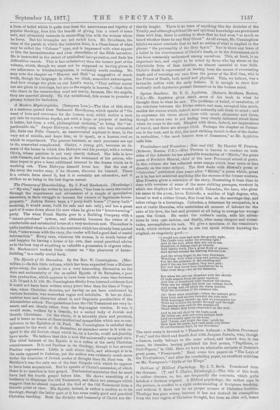The Epistle of St. Barnabas. By the Rev. W. Cunningham.
(Mao- millan.)—In this little volume, which has been expanded from a Hulsean prize-essay, the author gives us a very interesting discussion on the data and authenticity of the so-called Epistle of St. Barnabas, a poor thin production, which appears to have been written some time between A.D. 70 and A.D. 130. Mr. Cunningham thinks from internal evidence that it could not have boon written many years later than the time of Vospa- sian, when Christian doctrine, not having as yet been confronted by various heresies, was somewhat vague and indefinite, It has an Alex- andrine tone and character about it, and linguistic peculiarities of the Alexandrine school. The quotations from the Old Testament are very in- exact, and are clearly taken from the Septuagint version. It was, it would seem, written by a Gentile, for a united body of Jewish and Gentile Christians. On the whole, it is tolerably plain and practical, and it bears no traces of those intellectual sympathies which are so con- spicuous in the Epistles of St. Paul. Mr, Cunningham is satisfied that it cannot be the work of St. liarnabas, as mistakes occur in it with re- spect to the old Jewish ritual which ho, as a Lova°, could not riossibly have made. We believe that this is now the universally accepted view. The chief interest of the Epistle is as a reflex of the early Christian consciousness. It is not Pauline in its theology, though it has several Pauline expressions. Little is said about faith, and although it is in the main opposed to Judaism, yet the author was evidently much more under the dominion of Jewish modes of thought than St. Paul was. St. Matthew's was the only one of the four Gospels with which he appears to have been acquainted. But he speaks of Christ's ascension, of which there is no mention in that gospel. Tischendorf maintains that he must have had the fourth gospel before him. He shows something of a tendency to disparage the Old Testament, and there are passages which suggest that he almost regarded the God of the Old Testament from a Gnostic point of view. His Epistle, indeed, is rather a medley as to its theology, though the latter part of it has some really good and practical Christian teaching. Both the divinity and humanity of Christ are dis- tinctly taught. There is no trace of anything like the doctrine of the Trinity, and although spiritual life and spiritual knowledge are prominent ideas with him, there is nothing to show that he had even "so much as heard whether there be any Holy Ghost." At all events, Mr. Cunningham thinks we must conclude that he had no notion of what is implied in the phrase "the personality of the Holy Spirit." Nor is there any trace of a belief in the vicariousness of Christ's death, or in the Atonement, as it has been commonly understood among ourselves. This, at least, is an important fact, and ought to be noted by those who lay stress on the Calvinistio form of that doctrine, as almost essential to true faith. Christ's death is represented as having been the moans of overcoming death and of rescuing our race from the power of the Evil One, who is the Prince of Death, both moral and physical. This, we believe, was a favourite notion with the early fathers. It is enough to show how variously such mysteries present themselves to the human mind.






























 Previous page
Previous page